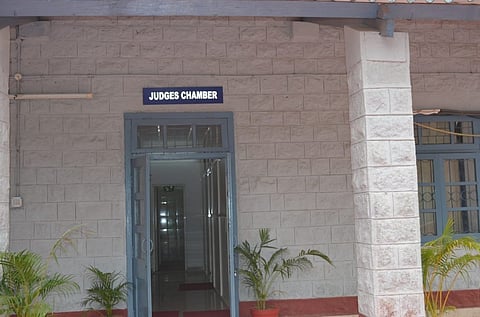
- Latest Legal News
- News
- Dealstreet
- Viewpoint
- Columns
- Interviews
- Law School
- Legal Jobs
- हिंदी
- ಕನ್ನಡ

Union Home Minister Amit Shah’s recent controversial remarks on former Supreme Court judge Justice B Sudershan Reddy has ignited an important debate on judicial independence and political accountability.
While 18 retired judges have rightly warned against “prejudicial misinterpretation” of judicial pronouncements by political leaders, especially senior leaders, the issue cannot be addressed in purely sentimental or institutional terms. It also raises very important questions about how judges, once they voluntarily cross into public life (elections), should reconcile their past judicial record with present political roles.
It is not in dispute that when on the Bench of a court of record, judges' pronouncements are not personal views but binding decisions of that Court. To show those rulings as sympathy for extremism or terrorism is institutionally corrosive and dangerous. The 2011 Nandini Sundar v. State of Chhattisgarh (popularly known as the Salwa Judum case), authored by Justices Reddy and SS Nijjar, struck down the practice of arming tribal youth as special police officers as unconstitutional after giving sufficient reasons. The judgment reflected constitutional concerns about State responsibility for safety and security, due process, human rights and the state’s sovereign monopoly over legitimate use of force. To label such a pronouncement as “supporting Naxalism” conflates judicial reasoning with partisan politics and risks undermining judicial independence at large.
At the same time, the position may shift once a retired judge volunteers to enters the political arena. It’s my most humble view that by contesting for the Vice-President’s office, Justice Reddy is no longer merely a former judge our highest court; he is a political candidate in a vibrant democracy. In that role, his record - including judgments he delivered - is legitimately open to debate, with certain riders. This not inconsistent with democratic practice.
Let's not forget Justice HR Khanna’s dissent in ADM Jabalpur (1976) which has long been celebrated in public discourse, while Justice Ray’s majority opinion in the same case has been criticised as enabling authoritarianism. Similarly, the judgment in Kesavananda Bharati (1973) continues to be invoked in political arguments by both the BJP and the Congress against their political opponents. Judicial pronouncements, once delivered, form part of the public record and can be praised or criticised. However, it should be without personalising motives.
A further issue arises in cases where judges, after retirement, seek or accept positions that are political in nature - whether as a Members of Parliament or constitutional office-holders like the Vice-President. Many such judges try to strike a careful balance and rightly so. Some of them wish to enter public life, but also want to remain insulated from partisan clashes by invoking their judicial past. This hybrid expectation is problematic. If a retired judge of a highest Court enters politics and contents elections, he cannot simultaneously claim the immunity and sanctity of judicial office while engaging in electoral contest. Political legitimacy flows from democratic scrutiny including public debate, not judicial immunity.
This principle of scrutiny is not alien to Indian constitutional law. The Supreme Court in Association for Democratic Reforms (2002), and later in People’s Union for Civil Liberties (2003), held that voters have a fundamental right to know the antecedents of candidates contesting elections, including their criminal records, financial status and educational background. It was also held that right to such information is part of Article 19(1)(a). Such logic is equally applicable to the Vice-President’s election, even though only elected representatives participate in the election. If criminal cases, debts and educational qualifications are matters of public debate, so too must be the judicial record of a candidate who once held constitutional office as a judge. However, we should remain conscious of the fact that judicial pronouncements are not judge’s personal opinions.
The line of propriety, therefore, lies in how criticism is framed. It is entirely valid to argue that the Salwa Judum ruling weakened counter-insurgency measures or imposed an impractical burden on the State. That is a critique of outcomes and policy implications, however legally or constitutionally invalid the same is. What is unfair, inaccurate and unacceptable that is to say that the judgment in question “supported Naxalism.” Such allegations impute motives, erode public faith in judicial impartiality and risk creating a chilling effect on sitting judges who may fear political backlash for their rulings. People in responsible political positions should avoid all or any actions which will have even remote effect on the judiciary. This applies to even retired Supreme Court or High Court judges who become activists after retirement.
Judges, while in office, must be shielded from partisan attacks, but candidates for high political office must accept full public scrutiny of their record. Retired judges of the highest courts who voluntarily step into politics by contesting elections cannot expect to carry only the aura of judicial dignity without also bearing the burden of democratic accountability. To protect judicial independence and ensure political legitimacy, we must distinguish between debating judicial outcomes and imputing motives. That balance alone will preserve both the dignity of our courts as well as the robustness of our democratic discourse.
As rightly stated by Justice Reddy in his public announcement,
“...May our democratic spirit continue to guide us all”, even in elections and election campaigns.
Praveenkumar Hiremath is an advocate practicing before the High Court of Karnataka.